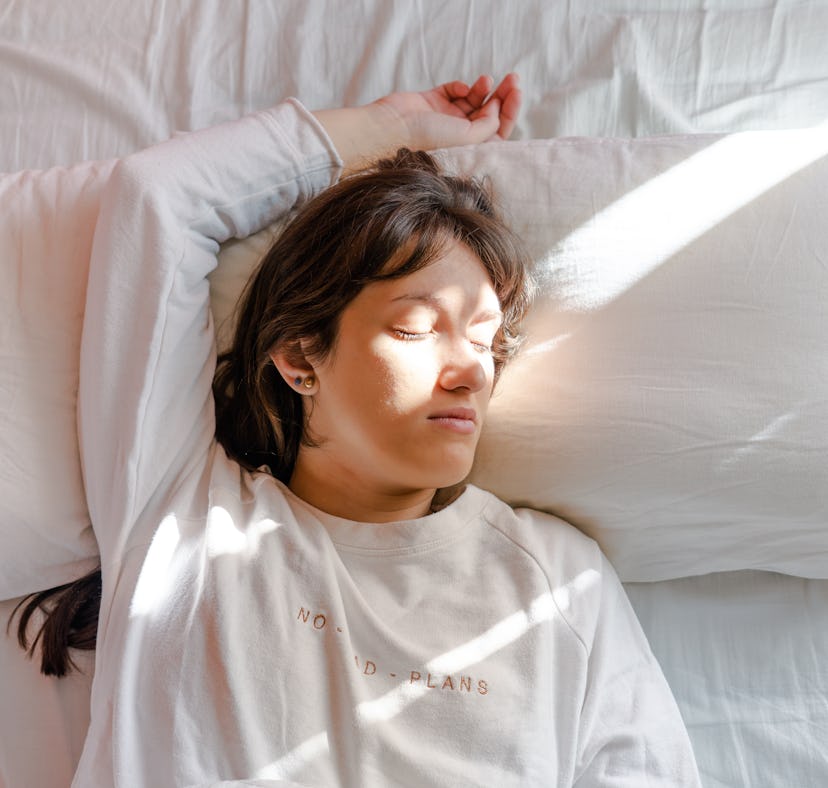
Experts Explain Why Some People Sleep With Their Arms Above Their Heads
It’s called the “starfish” position.
If you're like most people, then you probably don't give a second thought to your sleep position until you're having one of those nights that make you toss and turn for what feels like forever. After a night when you can only get comfortable with your arms splayed out behind you, you might start wondering, “Why do I sleep with my arms above my head?” What does sleeping with arms up mean? Does it impact your sleep quality or your health? This might sound silly, but could it even reveal something crucial about your personality? According to experts, sleeping with arms above your head could mean a whole lot.
People who sleep this way are in the minority, according to a 2017 study by the Better Sleep Council, but they’re not totally unheard of. The research found that "starfish sleepers," AKA those who lie on their back with their arms up near their head or pillow, make up only 7% of the population. Most people sleep in the fetal position, curled up on one side.
“Side sleeping is also the fetal position,” Dr. Shane Creado, M.D., a double-board-certified sleep medicine doctor and psychiatrist, tells Elite Daily. “The ideal position to sleep in is the non-dominant side. For most people, this is the left side.” This, he says, is because sleep is the most vulnerable thing we do. “Our subconscious mind may feel safer [sleeping on the side], as your dominant hand can raise up to protect you in case of attack.” So, starfish sleepers, sorry to say, but you are ill-prepared for an attack in the night. But what else could this sleeping position mean besides poor survival instincts?
What Determines Your Sleep Position?
There are a lot of factors that could affect which position your unconscious body decides to slumber in. According to Creado, “Different positions may be habitual, related to breathing, or other factors such as pain.” If you’re pregnant ,for example, sleeping on the left side is preferable “because when you think of the weight of the fetus and uterus, it can put pressure on the inferior vena cava (situated to the right of the aorta),” Creado tells Elite Daily. “The inferior vena cava is a large vein that brings blood to the heart, from the lower body and legs.”
Or maybe you have sleep apnea, which is usually worse when sleeping on your back. “Our airways are floppy front-back, and the tongue can fall back to obstruct the airway under the influence of gravity,” explains Creado. “However, sleeping position also is determined by the person's pillow, mattress, pain, arthritis, and other factors,” he adds.
What Sleeping With Your Arms Up Means
Chris Brantner, a certified sleep science coach, tells Elite Daily that while sleeping in a certain position each night could just be a habit and nothing more, another explanation could be that you sleep with a partner, and you raise your arms above your head to create extra space for cuddles.
However, sleeping this way could actually indicate that you aren't breathing as easily as you should be. "Some people sleep with their arms above their heads, as it's a natural way of opening up the lungs," Brantner says. "If you don't typically fall asleep in this position, but find yourself waking up like this, it could be a sign that you're having trouble breathing in the middle of the night." He adds that sleeping on your back can definitely lead to snoring, too.
Is Sleeping With Your Arms Above Your Head Bad For You?
As far as sleep quality goes, Creado says sleeping with your arms above your head isn’t something that should affect sleep quality, but rather, “it is the position and ergonomics that may result in pain or stiffness, that in turn may affect sleep quality.” That is to say, it’s all about whether you’re maintaining a comfortable position throughout the night.
However, it is possible that this position could lead to pain throughout the day. "Sleeping on your back in starfish position may induce lower back pain and sleep apnea," Terry Cralle, RN, a Better Sleep Council certified clinical sleep educator, tells Elite Daily. Luckily, though, you don't have to totally change the way you sleep if this position starts causing you discomfort. Just make some minor tweaks to make sure your body is well-supported. "If you experience back pain, consider placing a pillow or rolled-up towel under your knees to align the natural curve of your spine," Cralle suggests.
What It Means For Your Personality
Brantner admits he isn't sure how much stock he puts into deciphering someone's personality based on their sleep position alone. The truth is that personality types are complex, and while they might be based on a whole host of factors, including how you were raised, your natural inclinations, your learned behaviors, sleep probably isn't one of them. But he says there is actually a common belief about what a starfish sleeping pattern can say about you: Basically, the sleep science coach tells Elite Daily, many people believe starfish sleepers aren't comfortable being the center of attention, and may also be better listeners than other people. Whether that accurately captures your personality or not, embrace your uniqueness, you starfish, you.
Experts:
Dr. Shane Creado, M.D., double-board-certified sleep medicine doctor and psychiatrist
Chris Brantner, certified sleep science coach
Terry Cralle, RN, Better Sleep Council certified clinical sleep educator
This article was originally published on